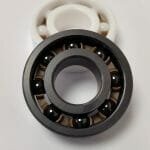As the automotive industry evolves, vehicle manufacturers need to change gears to stay ahead of the curve. CEO of norelem, Marcus Schneck, discusses how standard components will help solve the issues that are synonymous with new automotive trends.
The automotive industry is experiencing an unprecedented disruption in the wake of digitisation, automation and new machinery. It’s also shifting towards a more consumer and sustainability-focused market, giving automotive companies the opportunity to diversify and innovate.
The shift in technology is creating a complex challenge for automotive manufacturers and all those in between. However, rather than add to this complexity by developing new and unproven methods, materials, machinery and bespoke components, automotive engineers can instead turn to standard components. Having the knowledge, know-how and access to these tried-and-tested components will be key to unlocking the future of the automotive industry.
The road to electric dreams
As more countries introduce harsher carbon emissions regulations, the sales of electric vehicles (EVs) are flourishing. According to BloombergNEF (BNEF), electric cars will make up 57% of passenger car sales worldwide by 2040. However, as the sale of EVs increase, so does the demand for a sufficient charging infrastructure.
In 2018 the global EV fleet reached 5 million, but there were only 632,000 public charging outlets (BNEF) supporting this. This highlights a significant problem with not only the lack of charging stations, but the energy needed to power them. One potential solution addressing the lack of power charging stations is the solar-powered car.
Super-solar solutions
The shift from EV charged by electricity to solar-powered cars isn’t too far away, especially when you consider student engineering competitions such as the biennial World Solar Challenge. Created to find ways of harnessing the power of solar energy, the 2019 edition of the event saw 53 teams race 3,000km from Darwin to Adelaide in cars that were solely powered by the sun.
Of course, the challenge is a test of engineering talent and prowess, but arguably, it is also a test of how young engineers can build commercial awareness. Here, standard components can help engineers realise how costs can be kept down, and how to engineer solutions that meet real-world scenarios. In this case the cars had to meet Australia’s road traffic regulations, while also meeting this complex design challenge.
Three university teams participating in the race, supported by norelem, demonstrated perfectly how they used standard components in their vehicles, eventually taking top 10 places. With norelem’s donated components, RWTH and FH Aachen came sixth place and Jönköping University took tenth place in the Challenger Class race. Meanwhile HS Bochum came in fourth place in the Cruiser Class race. Alongside this, RWTH and FH Aachen’s team took home the Event Safety Award and David Fewchuck Spirit of the Event Award.
The use of standard components in this unique area of car production is crucial as it gives engineers of the future a technologically open platform, plus they can then adapt these parts to other applications. As the future of automotive embraces alternatively fuelled vehicles, the use of standard components will only help this transition.
Overcoming the skills shortage
Another test that the automotive industry is facing is the skills shortage. The UK is currently experiencing a serious shortage of engineers – a recent report by the Institution of Engineering and Technology (IET) had shown that 60% of engineering and tech firms are concerned that the lack of skilled engineers poses a threat to business.
Alongside this, the latest UK ‘State of Engineering’ report shows that the demand for engineers with a Level 3 skillset stands at 124,000, but only 22,000 students graduate at this level every year. It’s thought that 203,000 engineers with a skill set of Level 3 or more will be needed every year to meet demand through to 2024.
In the face of rapid technological advancements and a changing political and economic landscape, closing this skills gap is vital. Through support and education, engineering manufacturers can provide new ways to inspire young minds.
Learning to win
Another initiative that is allowing engineering students to build their skills and gain valuable experience is the annual Formula Student competition.
Regarded as Europe’s most established student engineering competition, Formula Student is a yearly engineering challenge that sees teams of university students from around the world design and build formula-style race cars. The teams then take the cars to race events around Europe to test and race them. The Formula Student UK event in 2019 took place at Silverstone from 19th-21st July 2019.
In the lead-up to the event, norelem donated standard components to the engineering teams at Southampton University (Southampton University Formula Student Team SUFST) and the University of Birmingham (UB Racing) to help them build their cars. To aid design, students used THE BIG GREEN BOOK from norelem that features over 45,000 standard elements. This meant students had access to products that would not only maximise efficiency and save time during production, but they could think about some new and exciting ways to apply these pieces.
A standard approach to automation
Automation is pervading every industry and the automotive industry is feeling the impact. From Machine Vision (MV) robots providing automated internal machine inspections to collaborative robots (cobots) working on assembly lines, automation is creating a safer, more efficient workplace for engineers.
However, many small-to-medium automotive manufacturers may find that the initial outlay, maintenance and servicing of new machinery prevents them from deploying robotics. As the overall cost of robotics is difficult to assess and often exceeds a single person’s annual salary, it can be difficult to justify.
Again, here is where standard components can be an excellent choice for small-to-medium sized production lines, as they save time and reduce cost. With drives, controls, belts, pulleys, gears and more all available in various standardised sizes and materials, manufacturers can quickly and easily automate different parts of their processes, without the need for bespoke, costly components.
Alongside this, there’s no need to pay for someone to come in and build the machine in question – all you need can be obtained from standard component manufacturers and suppliers such as norelem including CAD drawings, datasheets and assembly instructions.
Standard Components – The Backbone of Engineering
As new trends, processes and technologies are introduced, they come with several challenges. From the design issues to ensuring safety standards and lack of skills, all these need to be addressed.
By understanding how to apply standard components effectively, automotive manufacturers can effectively reduce costs, save time, and focus on meeting consumer needs. While there’s plenty of noise circulating on new, disruptive and often confusing technologies, standard components are here to simplify these challenges, and act as the backbone of good, solid engineering.
For more about norelem, please visit www.norelem.co.uk.





